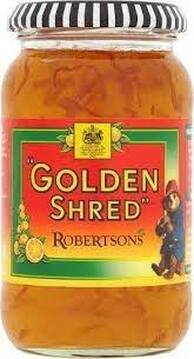Marmalade
 The word marmalade comes from ancient Greek words for honey and apple.
The word marmalade comes from ancient Greek words for honey and apple.The Greek word for honey is meli, from the Proto-Indo-European (PIE) root melit (honey). The Greek word for apple is melon. Put these Greek words together and you get melimelon—a concoction made by mixing honey with apples. Latin melimelum comprised honey and an apple-quince mixture.
The word marmalade, a preserve or confection of pulpy consistence made from honey and quince, came to English in the 1530s, from French marmelade and Portuguese marmelada (quince jelly). Quinces were once a very popular fruit; however, because they are very hard and take a lot of time to prepare for eating, they have fallen out of favor.
Marmalade is neither a jam nor a jelly. Today marmalade is made from the juice and peel of citrus fruits boiled in sugar and water. Very briefly, a jam is mainly fruit; a jelly is gelled fruit juice with the fruit pulp and peel removed. A marmalade is gelled fruit juice that contains the fruit pulp and peel, particularly orange peel, which gives it a distinctive bittersweet taste.
Originally, in the 16th century, marmalade was something eaten in the evenings like a dessert or snack. The Scots moved marmalade to the breakfast table and by the 19th century the British had turned to this practice as well. In 1864, the Scottish grocer James Robertson created the popular brand of marmalade that still carries his name.
-o-
Speaking of fruit: Originally, the English word apple was a generic term for any kind of fruit, except berries. For example, dates were known as fingerappla, literally ‘finger apples’. In the 14th century, an appel of paradis was a banana. When pineapples first appeared in England in the late 14th century, they got their name because their shape resembled a pinecone; hence a ‘pinecone fruit’ or ‘pine apple’. This is analogous to the French use of pomme de terre (apple of the earth) meaning potato. It was only in the 18th century that we now know as apples came to be called apples.
Reference: Online Etymological Dictionary, https://www.etymonline.com/
David’s Wordshop Blog: http://www.davidtickner.ca/blog
www.davidtickner.ca
Published on May 29, 2022 07:35
No comments have been added yet.



